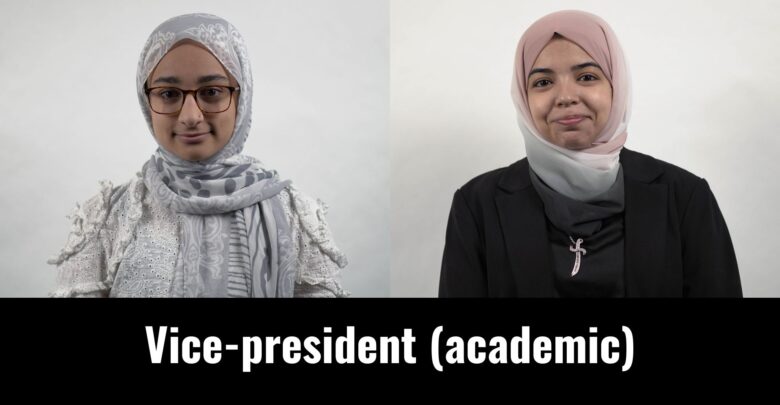SU Elections 2024 Q&A: Vice-President (Academic)
The 2024 Students' Union elections has two candidates for vice-president (academic) — Layla Alhussainy and Farah Elgaweesh.
 Lily Polenchuk
Lily PolenchukThe vice-president (academic) of the Students’ Union (SU) is responsible for all advocacy efforts that impact students’ academic experiences. This role involves collaboration with student faculty and department associates. As well, they participate in various boards and committees, such as the SU Policy Committee, General Faculties Council (GFC), and the Council of Faculty Associations.
There are two candidates in the 2024 vice-president (academic) race:
- Layla Alhussainy, a fourth-year religious studies and sociology student.
- Farah Elgaweesh, a first-year nursing student.
The following interviews have been edited for brevity and clarity.
Why have you decided to run for vice-president (academic)?
Layla Alhussainy: I would like to ensure students’ academic success, and work in eliminating the barriers that students may face throughout campus and their academic journey here. And, ensure that the challenges are tackled.
Farah Elgaweesh: I decided to run for vice-president (academic) in order to represent groups of students on campus that have been historically underrepresented. Coming from a background of health sciences and being a first-year, I think a lot of my perspectives are quite unique and diverse, and I am dedicated to listening and learning from other student groups.
I want to advocate for more credible representations in terms of academic concerns, and continue consulting with student groups in order to ensure that diverse perspectives are being heard before all decisions are made. I’m really passionate and dedicated to solving the issues that come my way by making sure that students’ voices are being heard.
What would you say are the three main takeaways from your platform?
Alhussainy: I am advocating for accessibility, accountability, and inclusivity.
I would like to focus on accessible affordability in the learning environment as well as accountability within transparency and student wellness. And with inclusivity, I would like to have inclusive accommodations and the practices of equity, diversity, and inclusion (EDI) consistent everywhere.
Elgaweesh: There are three overarching themes in my platform. The first one is to enhance academic supports. That’s through reducing academic advising wait times and working on the exam deferral policy.
The second theme is to increase accessibility to learning by promoting the Zero Textbook Cost (ZTC) program, and further promoting the the hybrid learning option. This is in order to ensure that students’ academic needs are being met, even if they can’t come to university every day.
My third point is to promote EDI by working to translate BearTracks to French, and improve the student crisis hub in order to ensure that students have equal access to tools and resources.
Over the past two years, vice-president (academics) have worked with the university on revising the academic integrity policy, working to make it more clear and easier for students to understand. How do you plan to build on past work, especially with the rising concern of artificial intelligence (AI) use?
Alhussainy: It is essential that we have clear guidelines established around academic integrity, especially with implementing paths and guidelines of using AI as a tool. So basically, the focus isn’t on punishing students, it’s making their academic journey more enriching through the resources we have available.
Elgaweesh: It’s important for students to be aware of the current policies that are in place, because sometimes students don’t know what rules are in place. That is something that can be improved through transparency.
For example, we can integrate the academic integrity policies into classes by making sure that professors encourage students to look at that and to take the quiz that is on the U of A website, and maybe working with professors to integrate that into the course.
During the terms of past vice-president (academics), they have worked to implement mandatory Indigenous content in university courses. How would you support Indigenous initiatives such as this in your work?
Alhussainy: I acknowledge my position as a settler, and it is my responsibility to ensure that we listen to and collaborate with Indigenous peoples. One of the points in my platform is decolonizing our education and embedding Indigenous course content in our learning.
Elgaweesh: Integrating the goals of the Aboriginal Relations and Reconciliation Committee (ARRC) recommendations is something that is incorporated into many of my platform points.
I plan to further work with the Indigenous Students’ Union (ISU) and other parties involved in order to ensure that their consultation is being taken into account. I’d work to further promote Indigenous course content by looking at the potential of introducing a mandatory Indigenous or Native studies class for all degrees. This is already implemented in some faculties, such as the faculty of nursing. So, promoting that across all faculties is something I mention in my platform.
Through the ongoing affordability crisis, students have shared concerns about the accessibility and affordability of textbooks. The SU has taken several measures to address these concerns over the years, such as through ZTC and its choice to oppose the Academic Materials Program (AMP). How would you further address these issues?
Alhussainy: Affordability has been an ongoing issue and challenges continue increasing as cost-of-living increases. I plan to advocate for furthering ZTC and evaluating the additional areas for minimizing student spending fees. An example of that would be through the verification of the enrolment fee.
Elgaweesh: I hope to promote ZTC by ensuring further work with professors and vice-provosts of academics to increase the number of classes that have ZTC flagged on BearTracks. This is an important issue to bring up, especially with the increasing tuition.
I would work to further increase the number of classes that adopt ZTC, and ensure that students are aware of these classes. And I will also provide incentives to professors in order to encourage them to adopt ZTC.
– With files from Dylana Twittey.




